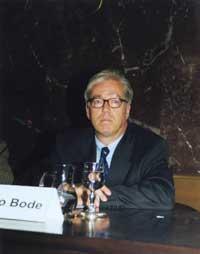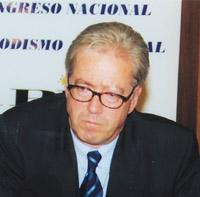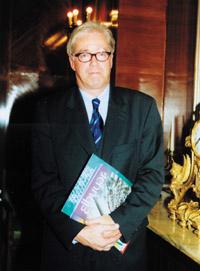Thilo Bode, director of Greenpeace.
2000/02/20 Kortabarria Olabarria, Beñardo - Elhuyar Zientzia
- Have you been working for the environment for many years, has anything changed in recent years?
- Although the environmental debate is very young, with only 30 or 40 years, the problems are enormous. From a retrospective perspective it is not difficult to realize that there have been major changes in environmental protection regulations. Work for the environment was based on concrete and concrete issues, pollution problems, river status, etc. Today the debate is not limited to that, we are discussing how it is and how it should be the relationship between society and nature, what we should do with the resources that nature offers us. Therefore, there has been an important leap, steps have been taken from concrete issues to difficult issues and general decisions, environmental policies, the environmental economy and how to achieve social-environmental balance.
Today it is admitted that there are major environmental problems, but the queue for the next round remains too large, as we do not agree on ways of solving.

- Would you be able to highlight among all the general problems the most important?
- The threats are many, the desertification process, GMOs, global warming… and it is not easy to distinguish the most important. However, I would highlight two. On the one hand, global warming derived from the abusive use of fossil fuels and, on the other, the loss of biodiversity caused by humans. Bear in mind that the speed of biodiversity loss by human action has increased considerably. According to experts, this loss is 10,000 times faster than nature itself would produce. Global warming also has to do with biodiversity loss and is serious, since the damage caused is irreparable, there is no return.
- And what can be done before these problems?
- We should immediately start working with the necessary measures. The excessive use of fossil fuels indicates how we live, generate tons of trash and waste the resources we have. Biodiversity loss is also a reflection of the imbalance between North and South, as overexploitation is causing the loss of large forests. In the next century we will increase between 3,000 and 4,000 million inhabitants on Earth, most in the South, so the struggle with nature is more evident. However, you cannot resist.
We have identified the problems and it is time to provide solutions. There is no shortage of solutions, we detect what they can be, but they do not come into force. All this has a lot to do with political decisions. There are parts of society that want to face problems, but those on the other end have more strength. Therefore, the key can be in the growing strength of places where political decisions are made.
- However, we live in an increasingly global world. Although appropriate and direct decisions regarding the environment are made in certain places, it seems that as long as there is no general decision, this can hardly have a real effect.
- Globalization is a new phenomenon and not at all bad. In fact, it can promote the promotion of civil societies, offers the possibility of globalizing the dissemination of information, allows visualizing the possibilities of environmental workers, debate and talk. But globalization also has its contras. One of the characteristics of the global world is the free market. We are not against the free market, but we must analyze well what is done in its name, because in its name many environmental agreements are rejected. The free market is a right we have, but if it hurts the environment we have to face it. It should be based on sustainable development.
Market liberalization means a decrease in prices and other options, such as renewable energy, cannot compete like this. Political measures are therefore necessary. If traditional energy sources are used, their cost in nature should be analysed and standardised worldwide to avoid deterioration.
On the other hand, globalization has been an excuse for states not to make decisions, but this is not true, because to their extent they have to do in water management, in natural parks or in defining energy policy.
- In any case, international decisions will also be necessary, right?
- They say that strong international institutions are needed, and it is true that they are necessary, but we also need state institutions. International organizations cannot have authority if they are not legitimized, for example, the Kyoto agreements have no strength because some states do not help them.
- Therefore, is it necessary to foster cooperation to face environmental challenges?
- To address environmental challenges, governmental and international institutions will work, especially international ones, due to the increasing vulnerability of States. In the future, environmental policies will not be separable from other policies. The environment has become international, so it can affect everything else. Environmental problems cannot be solved if peace and justice are not achieved in the world, if society has no harmony it cannot think of taking care of the environment. To have a better future we have to change our policies.
- The political will is decisive, we have to change the economic models… are we ever closer to those objectives?
- As mentioned above, environmental movements initially focused on concrete problems. Today we have overcome it, the debate is broader and we are talking about the use of resources. What happens is that before all these ideas there is more force, since the pressure groups are getting bigger. We really see that there may be will, but it does not force, because the economic interests we face are great.
- In the fight against these great forces the groups in favor of the environment stand out. Greenpeace is one of them, which over the years has much to say and directly influence the international arena. Greenpeace has also been accused of being a parapolitical force. What do you think?
- I think NGOs (NGOs) have played an important role in democratic systems because governments themselves are not able to cope with pressure forces. That is why they exist. Groups like ours cannot make serious mistakes because otherwise we would stay out of play. That is why I say that we are neither parapolitical nor important. Without us and without groups like ours I don't know where the environmental debate would be, I wouldn't dare say.
- Another criticism made to Greenpeace is that it enters subjects with the exclusive endorsement of scientific or scientific methods.
- It only answers the questions that science asks itself and sometimes has a very closed vision. In most cases, scientists base the debate on health risks, but agriculture and the environment are more important to us. We have our own vision and when necessary we also bring ideas from scientists.
- Here are some specific issues. For example, green dot, green products, etc. They look more and more, but it seems that governments are limited to that, education is despised. Is this not the reflection of international deception?
- Well, the green dot is a unique element that can be included within information for consumers. The labeling of GM products can also be seen from this perspective, recycling too… I do not know if that is the way, but the important thing is to have a good and transparent information, both in terms of the quality of the products and in terms of the way of production of them.

As for the issue of education, it would also be a challenge for us, because we must teach society how and why the environment is destroyed. However, the lack of environmental education has also been used as an excuse after the damage. That work is necessary, but it is not all. The media also have a lot to do. Destruction in Europe is generally less, but where are the images of this destruction, the ozone layer, global warming, etc. ?
- When talking about nuclear waste, there is a certain consensus among international scientists to do nothing with those waste, that is, that tomorrow or past is the solution to collect and store them. Does Greenpeace agree?
- The nuclear industry wants to lead us to a debate on technological solutions for nuclear waste, and I think it is a wrong way. What we demand, and what we need, is a determined political and industrial decision not to produce nuclear energy. Once this is decided, we should start thinking about what to do with nuclear waste. However, the issue of nuclear waste has no solution for the moment, and we say it is a topic for technicians and engineers, since their work should be to solve the problem so that waste can be stored in a way that does not harm future generations. However, we know that it will actually be a complicated issue.
- Transgenic products have been mentioned by yourself. Why is Greenpeace so passionate about the fight against GM products?
- Greenpeace in principle is not against genetic engineering, but against the use of these technologies in agricultural products.
We believe that the use of genetically modified products is favoring more savage farms than today. Our alternative is modern, ecological or biological agriculture, where there is no room for GM products. We have been told on several occasions that we are against development, and that is not true.
We are not against development, but against the misuse of technology. Greenpeace is committed to development as long as development faces the real problems of society. With GM products they only seek to increase the profits of large companies, they do not have a real benefit for consumers. We are in favor of technology if it is used, for example, to boost renewable energies, but we are against this latest technology - for example - if it is used to obtain nuclear energy.
Over the past 20-25 years environmental destruction has been very harsh and technology has had a lot to do with it. Therefore, I must say that technology has been used to harm the environment faster, increase the speed of damage. But the question is not whether or not technology has contributed to the destruction of the environment, but to what purpose it has been used. I think we should do a reverse process of what has been done, using current technology to protect the environment and not to destroy it.
Thilo BodeDirector of Greenpeace International since September 1995. Before taking over he was director of Greenpeace in Germany, since 1989. Greenpeace is an international environmental organization with almost 3,000,000 members. Greenpeace has offices in thirty-three countries and a staff of 1,000 workers. The director of Greenpeace studied Sociology and Scientific Policy at the University of Regensburg in Germany, where he obtained his doctorate in 1975. Three years later he moved to the German Bank for Reconstruction and Development to work in project management. Collaborative projects with Africa and Asia were their responsibility. In 1981 he began to work on his own with various institutions, governments and international consulting companies. Born in Bavaria, Thilo Bode currently lives in Amsterdam, where the international headquarters of Greenpeace is located. |
Published in the supplement Natura de Gara

Gai honi buruzko eduki gehiago
Elhuyarrek garatutako teknologia





